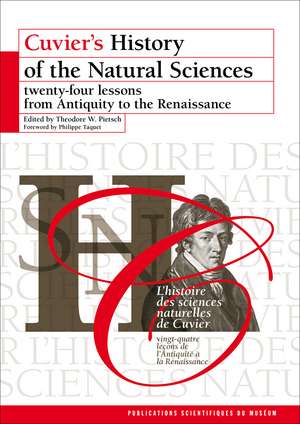Cuvier's History of the Natural Sciences: Twenty-four Lessons from Antiquity to the Renaissance
Editat de Theodore W. Pietschen Limba Engleză Paperback – 14 oct 2014
Available for the first time in English, Georges Cuvier’s extraordinary History of the Natural Sciences provides a detailed chronological survey of the natural sciences spanning more than three millennia. Cuvier had encyclopedic knowledge, an incomparable memory, and fluency in many languages, making him the ideal person to investigate and interpret firsthand the scientific literature of Europe. Supplying a set of useful references to a vast ancient literature not easily found elsewhere, this first of five volumes offers new insight into the renowned French naturalist’s concept of the natural sciences and the breadth of this human endeavor.
Preț: 548.21 lei
Nou
Puncte Express: 822
Preț estimativ în valută:
104.92€ • 108.70$ • 87.56£
104.92€ • 108.70$ • 87.56£
Carte indisponibilă temporar
Doresc să fiu notificat când acest titlu va fi disponibil:
Se trimite...
Preluare comenzi: 021 569.72.76
Specificații
ISBN-13: 9782856536841
ISBN-10: 2856536840
Pagini: 734
Ilustrații: 50 figures
Dimensiuni: 165 x 241 x 38 mm
Greutate: 1.41 kg
Editura: French National Museum Natural History
Colecția French National Museum Natural History
ISBN-10: 2856536840
Pagini: 734
Ilustrații: 50 figures
Dimensiuni: 165 x 241 x 38 mm
Greutate: 1.41 kg
Editura: French National Museum Natural History
Colecția French National Museum Natural History
Notă biografică
Theodore W. Pietsch is the Dorothy T. Gilbert Professor in the School of Aquatic and Fishery Sciences and Curator of Fishes at the Burke Museum of Natural History and Culture at the University of Washington in Seattle. He is the author of many books, including The Curious Death of Peter Artedi: A Mystery in the History of Science.
Recenzii
“I need to tell you about a book that is astonishing, prodigious, and colossal. Reading it was a labor of lust, an escape into clear thinking, and a delight on many levels. These superlatives apply to the book’s author, its content, and to the scholarship evident in bringing the work to a modern audience. . . . So what’s so enthralling about some lectures from 1829? Nearly everything, as it turns out. . . . No matter whose work Cuvier reports, these discussions are lucid, insightful, and fascinating. . . . In the end, the wonder of this book is in the vast panoply of names, dates, ideas, places, wars, and theories that make up our ancient history. The vastness of the story and the clarity with which it is told is a marvel. One wonders at the brilliance of Aristotle, but equally at the brilliance of Cuvier who tells the story so well, and at the perseverance and scholarship of Pietsch for making this package intelligible. For those who never thought much about the history of science this book will be an eye-opener. I couldn’t put it down.”
